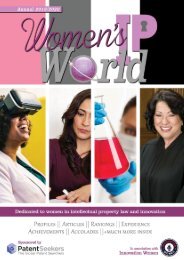Global IP Matrix - Issue 8
Dear Readers We are delighted to present you with issue 8 of The Global IP Matrix magazine! Once again, we have fantastic content delivered to you by industry professionals who are experts in their field. This issue explores IP & Innovation in Africa, anti-counterfeiting measures in the Caribbean, IPR Infringement in China, plus many more engaging articles around the IP ecosystem. It's been a challenging few months; however, we are grateful that our clients and contributors share our vision. Together, we are heading for better times. We cannot thank our authors enough for their time and efforts to keep you, our audience up to date with news and stories from their own perspective and expertise. Look out for our next edition, in January 2021 and until then, stay safe, healthy & happy. Elvin Hassan – Editor
Dear Readers
We are delighted to present you with issue 8 of The Global IP Matrix magazine!
Once again, we have fantastic content delivered to you by industry professionals who are experts in their field.
This issue explores IP & Innovation in Africa, anti-counterfeiting measures in the Caribbean, IPR Infringement in China, plus many more engaging articles around the IP ecosystem.
It's been a challenging few months; however, we are grateful that our clients and contributors share our vision. Together, we are heading for better times.
We cannot thank our authors enough for their time and efforts to keep you, our audience up to date with news and stories from their own perspective and expertise.
Look out for our next edition, in January 2021 and until then, stay safe, healthy & happy.
Elvin Hassan – Editor
You also want an ePaper? Increase the reach of your titles
YUMPU automatically turns print PDFs into web optimized ePapers that Google loves.
Reserve Your Seat
at the Networking Event of the Year!
AFRICA AWAKENS:
Achieving agenda 2063
through innovation and
intellectual property
Table Topics
[
162 TOTAL
INCLUDING
39 CORPORATE
Corporate
Meet-ups
15
sessions
180
seats
1,620
seats
Social
Networking
AI POWERED CONNECTIONS | REGISTRANT DIRECTORY
CHAT AND BOOK VIDEO MEETINGS
www.inta.org/amlm20
Register Today! (Last day to register: October 30, 2020)
,
[
Speed Networking
150
sessions
31
sessions
BUILDING
10,425 seats
Hospitality
1,800
seats
3 BUILDINGS WITH 8 FLOORS
IN EACH BUILDING
1
832
seats
BUILDING 2
736
seats
BUILDING 3
720
seats
Writen by Sarah Norkor Anku (Mrs), Senior Partner,
Anku.Anku at law - www.ankuatlaw.com
Africa can no longer
be ignored; the lion
awakens from its
slumber!
AGENDA 2063 is Africa’s blueprint and
master plan for transforming Africa into
the global powerhouse of the future. It is
the continent’s strategic framework that
aims to deliver on its goal for inclusive and
sustainable development and is a concrete
manifestation of the pan-African drive for
unity, self-determination, freedom, progress,
and collective prosperity pursued under Pan-
Africanism and African Renaissance. 1 It is
an agenda to achieve the Pan-African vision
of an integrated, prosperous, and peaceful
Africa, driven by its citizens, representing a
dynamic force in the international arena.
Agenda 2063 encapsulates not only Africa’s
aspirations for the future but also identifies
key Flagship Programmes, which can boost
Africa’s economic growth and development
and lead to the rapid transformation of the
continent. 2 The flagship programmes include
the establishment of the African Continental
Free Trade Area (AfCFTA) to accelerate
intra-African trade and boost Africa’s trading
position in the global market place and to use
trade more effectively as an engine of growth
and sustainable development by doubling
intra-Africa trade, strengthening Africa’s
common voice and policy space in global trade
negotiations. 3
The African Continental Free Trade
Agreement, which establishes AfCFTA, aims
to liberalise the market for goods and services
and facilitate the movement of capital and
natural persons with a view to creating a single
market in accordance with the Pan-African
vision. The second phase negotiations of the
Agreement will provide safeguard measures
to the Agreement, including negotiating
Investment, Competition, and Intellectual
Property Protocols.
It is expected that the Intellectual Property
Protocol will cover the trade aspects of
Intellectual Property rights that contribute to
regional trade and value integration. Until the
Intellectual Property Protocol is negotiated
and developed into a legally binding Regional
instrument, the various member states
will adhere to the existing laws governing
intellectual property within their territories.
Estimates from the United Nations Economic
Commission for Africa indicate that the
AfCFTA holds the potential of boosting intra-
African trade by 52.3%. Covering a population
of over 1.2 billion, with a combined GDP of
over USD$3.4 trillion, the AfCFTA has created
one of the world’s largest free trade areas.
It is further estimated that by 2050 Africa’s
population will double, rising from the 1.2
billion to 2.4 billion, with over 60 percent
(60%) of people under the age of 25, and such
a large young population presents significant
opportunities and challenges. 4 Currently,
Africa has the youngest population globally,
with more than 400 million young people aged
between the ages of 15 to 35 years. 5
Consequently, the AU has developed several
youth development policies and programmes
at continental level to ensure the continent
benefits from its demographic dividend. The
policies include the African Youth Charter,
Youth Decade Plan of Action, and the
Malabo Decision on Youth
Empowerment, all of which
are implemented through
various AU Agenda
2063 programmes. 6 The
Youth Decade Plan of
Action focuses on
five key priority
areas, including
Youth Employment
& Entrepreneurship
and Education &
Skills Development. 7
There is much emphasis on
youth entrepreneurship,
innovation, and
employment.
Some governments, including Ghana, have
encouraged innovation and creativity among
the youth in particular.
With support from some development
partners, some are creating a much needed
infrastructure and facilities to promote
innovation and facilitate the scaling – up of
start-ups. A typical example is the Ghana Tech
Lab facilities, a technology hub for digital
innovations that seek to inspire innovation,
creativity, and ideation. The tech hub has so
far trained 1212 innovators across Ghana
with 11 start-ups in incubation. Its Africa
AI Accelerator program has been designed
to promote local innovations in the field of
artificial intelligence, machine learning, and
data usage. 8 The program is structured to
support entrepreneurs with innovative high
growth AI solutions that are commercially
viable, socially driven, and creatively designed
and can also be refined and scaled through
an acceleration program. The first cohort of
the program consist of 10 AI start-ups from
Ghana, South Africa, Uganda, and Rwanda.
In recent times Africa’s innovative
achievements have received much public
attention.












